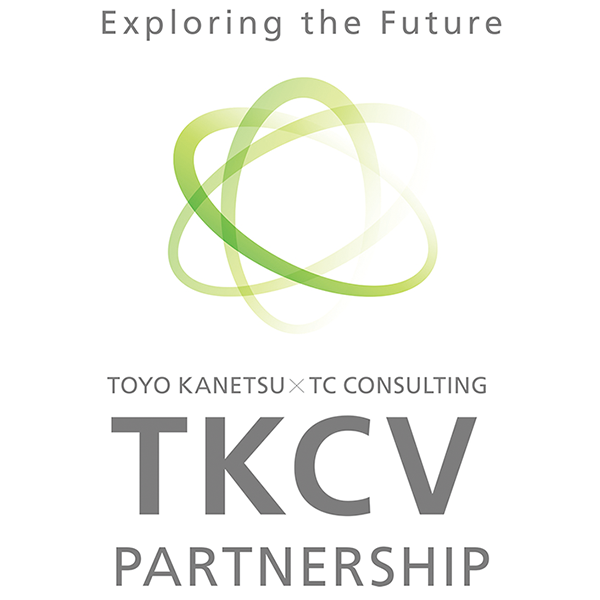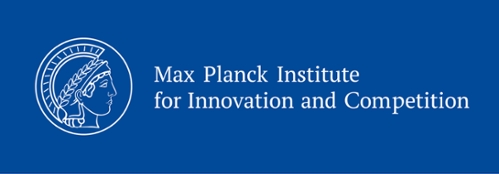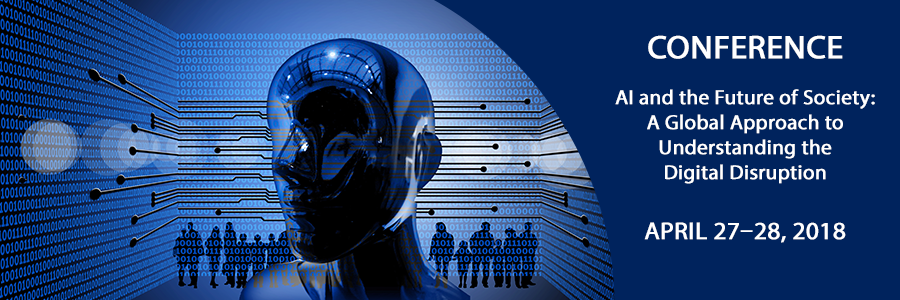AI and the Future of Society Conference
April 27 – 28, 2018 | UC San Diego
JFIT held a two-day conference of its new research program on Digital Disruption and the Future of Society. The goal was to analyze the ongoing changes associated with AI, IOT, industry 4.0 and society 5.0, with a focus on the social science perspective and the global comparison. The conference brought together scholars and practitioners from the U.S., Germany
View photos from the conference
Agenda
Friday, April 27, 2018
Location: UC San Diego, “The Village 15” Conference Room (directions)
9-9:15 a.m. — Welcome - Conference Motivation: Why Are We Here?
- Ulrike Schaede, Professor & JFIT Director, School of Global Policy and Strategy, UC San Diego
9:15-10:45 a.m. — Panel 1: The Future of Cyberspace - Security and Regulation
Moderator:
- Jennifer Johnson, Co-founder
and Principal, Canyon Snow Consulting
Panelists:
- Tai Ming Cheung, Director, Institute on Global Conflict and Cooperation, UC San Diego
- Peter Cowhey, Dean, School of Global Policy and Strategy, UC San Diego
- Jiro Kokuryo, Professor and Vice President of International Affairs, Keio University
- Akio Sato, Mitsubishi Research Institute
- Sheila Zuehlke, Major General (Ret.), U.S. Air Force
10:45-11 a.m. — Break
11 a.m.-12:30 p.m. — Panel 2: The Future of Automation - Autonomous Systems
Moderator:
- Dietmar Harhoff, Max Planck Institute for Innovation and Competition
Panelists:
- Henrik Christensen, Professor, Jacobs School of Engineering, UC San Diego
- Robert Cunningham, Colonel (Ret.), U.S. Air Force
- Ben Esplin, Partner,
SheppardMullin - David Le, Associate General Counsel, Lyft
- Tokio Matsuzaki, Visiting Scholar, Division of Minimally Invasive Surgery, UC San Diego
12:30-1:45 p.m. — Lunch
1:45-2 p.m. — Keynote Address
- Satoshi Tomita, Investment Committee Chairman, Toyo Kanetsu Corporate Venture Investment Partnership
2-3:30 p.m. — Panel 3: The Future of Money - Blockchain, Bitcoin
Moderator:
- Takeo Hoshi, Professor, Stanford University
Panelists:
- James Gatto, Blockchain
and Digital Currency Team Leader,SheppardMullin - Michael Melvin, Professor, Rady School of Management, UC San Diego
- Marc-Andreas Muendler, Professor, Department of Economics, UC San Diego
- Brooke Partridge, CEO, Vital Wave
- Sam Rosenblum, Director of Business Development, Coinbase
3:30-4 p.m. — Break
4-5:30 p.m. — Panel 4: The Future of Mankind - Privacy, Trust
Moderator:
- Gisela Trommsdorff, Professor, University of Konstanz
Panelists:
- Arisa Ema, Professor, The University of Tokyo
- Brett Frischmann, Professor, Villanova University
- Robert Friedman, Vice President for Policy and University Relations, J. Craig Venter Institute
- Uma Karmarkar, Professor, School of Global Policy and Strategy, UC San Diego
- Gari Walkowitz, Professor, Center
of Digitization, Technical University Munich
Saturday, April 28, 2018
Location: UC San Diego, School of Global Policy and Strategy, room 3106 (directions)
9-10:30 a.m. — Panel 5: The Future of Work – Job Assignments, Identity and Community
Moderator:
- John Ahlquist, Professor, School of Global Policy and Strategy, UC San Diego
Panelists:
- Anja Bodenschatz, TU München
- Lilly Irani, Professor, Communication, Science Studies, Critical Gender Studies, UC San Diego
- Nathalie Le Ngoc, Associate General Counsel, Salesforce.org
- Liz Lyons, Professor, School of Global Policy and Strategy, UC San Diego
- Noriyuki Yanagawa, Professor, The University of Tokyo
10:30-10:45 a.m.— Break
10:45-12:15 — Panel 6: The Future of Business – Disruptions and New Business Models
Moderator:
- Ulrike Schaede, Professor & JFIT Director, School of Global Policy and Strategy, UC San Diego
Panelists:
- Guilherme Hoefel, Principal Engineer, Qualcomm, Inc.
- Akie Iriyama, Professor, Waseda Business School
- Gregory Lee, Global President, Nokia Technologies
- David Michael, Co-Founder and Managing Partner, Anzu Partners
- Charles O’Reilly, Professor, Graduate School of Business, Stanford University
- Michael Yeomans, Post-Doc Fellow, Harvard University
12:15-1:30 p.m. — Luncheon
1:30-3 p.m. — Panel 7: The Future of the Social Sciences – Knowledge Creation and Education for the AI Transformation
Moderator:
- Stephan Haggard, Professor, School of Global Policy and Strategy, UC San Diego
Panelists:
- Roger Bohn, Professor, School of Global Policy and Strategy, UC San Diego
- Masaru Karube, Professor, Hitotsubashi University
- Soshi Otani, Internet Initiative Japan Inc.
- Florenta Teodoridis, Professor, Marshall School of Business, University of Southern California
- Pai-Ling Yin, Professor, Marshall School of Business, University of Southern California
3-3:15 p.m. — Break
3:15-4:45 p.m. — Panel 8: The Future of The Nation – Country Differences in AI Strategies
Moderator:
- Franz Waldenberger, Director, German Institute of Japan Studies
Panelists:
- Dietmar Harhoff, Professor, Max Planck Institute for Innovation and Competition
- Pat Johnson, Co-Founder and Principal, e Pluribus, LLC
- Hisashi Kanazashi, JETRO L.A./Ministry of Economy, Trade
and Industry - Megumi Naoi, Professor, Department of Political Science, UC San Diego
- Yuri Okina, Chairperson, Japan Research Institute
4:45-5:30 p.m. — Summary: What have we learned?
Speakers & Moderators
John Ahlquist, Professor, School of Global Policy and Strategy, UC San Diego
Ahlquist is an associate professor at GPS and a current fellow at Stanford's Center for Advanced Study in the Behavioral Sciences. His research focuses on political economy, comparative politics, labor market institutions, income inequality and international trade. His work looks at how advanced capitalism and democratic government reinforce or undermine one another, with a special focus on distributional conflict and the political mobilization of wage earners.
Anja Bodenschatz, TU München
Bodenschatz worked in the retail sector, for one of the world’s largest manufacturers of children’s toys, before she completed her master studies at the University of Cologne and became a researcher in the field of behavioral economics. Since then she has been involved in several research projects concerning the topics of compliance and anti-corruption measures. She specializes in descriptive and experimental research, concerning moral values, intentions
Roger Bohn, Professor, School of Global Policy and Strategy, UC San Diego
Bohn is a professor of management at GPS. His research began looking at technological knowledge — what it is, what it does and how to develop it — and has extended into looking how aviation, and by
Tai Ming Cheung, Director, Institute on Global Conflict and Cooperation, UC San Diego
Cheung is an associate professor at GPS and director of IGCC. He is a longtime analyst of and leading expert on Chinese and East Asian defense and national security affairs, especially related to economic, industrial, technology and innovation issues. Cheung leads the institute’s Study of Technology and Innovation, examining the evolving relationship between technology and national security in China. He was previously a correspondent at the Far Eastern Economic Review.
Henrik Christensen, Professor, Jacobs School of Engineering, UC San Diego
Christensen is the Qualcomm Chancellor's Chair of Robot Systems and a professor of computer science at the Department of Computer Science and Engineering. He is also the director of the Institute for Contextual Robotics. Christensen research focuses on systems integration, human-robot interaction, mapping and robot vision. He has published more than 350 contributions across AI, robotics
Peter Cowhey, Dean, School of Global Policy and Strategy, UC San Diego
Cowhey holds the Qualcomm Endowed Chair in Communications and Technology Policy and is dean of GPS. He is an expert on the future of communications and information technology markets and policy, specializing in U.S. trade policy, foreign policy, the Internet and international corporate strategy. He has extensive experience in government. In the Clinton Administration, he served as the chief of the International Bureau of the FCC and in the Obama Administration served a 12-month assignment as the senior counselor to Ambassador Ron Kirk in the Office of the United States Trade Representative, playing a key role in the strategic agenda for trade policy.
Robert Cunningham, Colonel (Ret.), U.S. Air Force
Cunningham served in the U.S. Air Force for 26 years as a
Arisa Ema, Professor, The University of Tokyo
Ema is a professor at The University of Tokyo and visiting researcher at RIKEN Center for Advanced Intelligence Project in Japan. She is a researcher in Science and Technology Studies and her primary interest is to investigate the benefits and risks of artificial intelligence. She is
Ben Esplin, Partner,
Esplin is a partner in the Intellectual Property Practice Group in the firm's San Diego office. His practice spans many areas of intellectual property law, and his areas of technical focus include social media, video games, social networks, virtual worlds, augmented reality, virtual reality, media, computer software, unmanned vehicle systems, computer graphics processing, mechanical devices, control systems, network infrastructure, security and maintenance, sound recording/reproduction, wireless communication and business methods.
Robert Friedman, Vice President for Policy and University Relations, J. Craig Venter Institute
Friedman is a vice president at the J. Craig Venter Institute (JCVI), a not-for-profit research institute dedicated to the advancement of the science of genomics and related disciplines. Friedman also directs JCVI’s Policy Center, which examines the societal and policy implications of genomics, synthetic biology, and other areas of modern biology and biomedicine. Friedman is also a professor of practice at GPS.
Brett Frischmann, Professor, Villanova University
Frischmann is The Charles Widger Endowed University Professor in Law, Business
James Gatto, Blockchain
Gatto is the leader of the Blockchain and Digital Currency Team and its Open Source Team. He leverages his unique combination of nearly 30 years of legal experience, business insights and attention to technology trends to help companies develop IP and other legal strategies that are aligned with their business objectives and address emerging regulatory issues associated with innovative technologies and business models. His focuses on all aspects of intellectual property, internet
Stephan Haggard, Professor, School of Global Policy and Strategy, UC San Diego
Haggard is the Lawrence and Sallye Krause Professor of Korea-Pacific Studies, director of the Korea-Pacific Program and distinguished professor of political science at GPS. He is a go-to expert on current developments in the Asia-Pacific region, particularly the Korean peninsula, and on the politics of economic reform and globalization. Haggard has written extensively on the political economy of North Korea with Marcus Noland.
Dietmar Harhoff, Professor, Max Planck Institute for Innovation and Competition
Harhoff is a director at the Max Planck Institute for Innovation and Competition and Honorary Professor for Entrepreneurship and Innovation at the Ludwig-Maximilians-University Munich. His research focuses on issues in innovation and entrepreneurship, intellectual property and industrial economics. He has a big passion for big data. Besides advising several public and private organizations, he is chairman of the Commission of Experts for Research and Innovation (EFI) of the German Federal Government issuing yearly reports with important recommendations for actions on innovation policy.
Guilherme Hoefel, Principal Engineer, Qualcomm, Inc.
Hoefel is a principal engineer and manager at Qualcomm in the Engineering Services Group. His work focuses on serving various business and engineering areas throughout the company and outside that can leverage data mining and machine learning for making better evidence-driven decisions. He obtained his master's degree at UC San Diego and a bachelor's degree from Cornell University, both in computer science with an emphasis in artificial intelligence and machine learning.
Takeo Hoshi, Professor, Stanford University
Hoshi is the Henri and Tomoye Takahashi Senior Fellow at the Freeman Spogli Institute for International Studies, professor of finance at the Graduate School of Business and director of the Japan Program at the Shorenstein Asia-Pacific Research Center, all at Stanford University. His main research interests include the study of the financial aspects of the Japanese economy, especially corporate finance, banking and monetary policy. He is a research associate at the National Bureau of Economic Research and at the Tokyo Center for Economic Research. He is also a senior fellow at the Asian Bureau of Finance and Economic Research.
Lilly Irani, Professor, Communication, Science Studies, Critical Gender Studies, UC San Diego
Irani is an assistant professor of communication and science studies at UC San Diego. She is a co-founder and maintainer of the digital labor activism tool Turkopticon. She is currently writing a book on the cultural politics of entrepreneurialism in transnational India. Her work has appeared at ACM SIGCHI, New Media & Society, Science, Technology & Human Values, South Atlantic Quarterly and other venues.
Akie Iriyama, Professor, Waseda Business School
Iriyama is an associate professor at Waseda Business School. Prior to joining Waseda, he served as an assistant professor of State University of New York at Buffalo for five years. He received M.A. and B.A. in economics from Keio University, Japan, and Ph.D. from the University of Pittsburgh. He has widely published in premier academic journals including Strategic Management Journal, Journal of International Business Studies, Strategic Entrepreneurship Journal and so on. Before pursuing his academic career, Iriyama worked for Mitsubishi Research Institute Inc., as an industry economist and business consultant.
Jennifer Johnson, Co-founder
Johnson is a co-founder and principal of Canyon Snow Consulting LLC. She is a recognized authority on the business implications of local, state and federal policy initiatives, and routinely consults on how to make corporate social responsibility a living and profitable part of business strategy. Clients rely on her for strategic and technical guidance in designing and implementing effective programs that create customer and stakeholder value.
Pat Johnson, Co-Founder and Principal, e Pluribus, LLC
Johnson is a co-founder and principal
Hisashi Kanazashi, JETRO L.A./Ministry of Economy, Trade
Kanazashi is the executive director of JETRO Los Angeles. He held positions at the Ministry of Economy, Trade
Uma Karmarkar, Professor, School of Global Policy and Strategy, UC San Diego
Karmarkar is an assistant professor at GPS and the Rady School of Management. Karmarkar examines the factors that consciously and unconsciously influence how people make
Masaru Karube, Professor, Hitotsubashi University
Karube is a professor of management at the Institute of Innovation Research, Hitotsubashi University. His current research interests cover the following topics: the source of distinctive
Jiro Kokuryo, Professor and Vice President of International Affairs, Keio University
Kokuryo is vice president of Keio University and is concurrently a professor at the Faculty of Policy Management. His research and teaching interests center on the development of business and social models that maximize the benefits of information technologies. He is particularly active in studying effective uses of open systems. Kokuryo is very active in serving public interests. As a member of a council to the Prime Minister’s IT Strategic Headquarters, he has been playing a central role in formulating Japan’s information technology policies.
David Le, Associate General Counsel, Lyft
Nathalie Le Ngoc, Associate General Counsel, Salesforce.org
Le Ngoc is associate general counsel at Salesforce.org, a public benefit enterprise that provides technology to social impact organizations. She leads multiple legal functions including employment, ethical compliance, litigation, marketing
Gregory Lee, Global President, Nokia Technologies
Lee is the global president of Nokia Technologies. Most recently, he served as president and CEO of Samsung Electronics, North America with a focus on driving fast growth and operational excellence. Lee is a proven consumer technology leader with a wealth of experience in transforming organizations and driving innovation. During his 13-year career at Samsung, he also served as Samsung's Global CMO, president of Samsung Asia and president and CEO of Samsung Telecommunications America. Prior to this, Lee led product development, sales and strategic initiatives for global consumer brands including Johnson & Johnson, Kellogg's and Procter & Gamble.
Liz Lyons, Professor, School of Global Policy and Strategy, UC San Diego
Lyons is an assistant professor of management at GPS. Her research primarily employs lab and field experiments to test questions related to organizational and innovation economics with labor and management as a common underlying theme. Her work on the organization of online work has been published in Journal of International Economics, American Economic Journal: Applied Economics, and featured in the New York Times and other major media outlets. She is a recipient of the 2016 Kauffman Junior Faculty Fellowships in Entrepreneurship Research.
Tokio Matsuzaki, Visiting Scholar, Division of Minimally Invasive Surgery, UC San Diego
Matsuzaki is a board-certified orthopedic surgeon in Japan and visiting scholar in the Department of Surgery at UC San Diego. His research experience includes robotic orthosis, biomechanics, cartilage biology and anti-aging. His recent study includes robotic surgery and ethics of artificial intelligence.
Michael Melvin, Professor, Rady School of Management, UC San Diego
Melvin is a professor at the Rady School of Management and
David Michael, Co-Founder and Managing Partner, Anzu Partners
Michael is a professor of practice at GPS and the managing director of Anzu Partners, an investment firm focused on helping innovative industrial technology companies achieve success. Michael is also
Jennifer Mueller, Professor, University of San Diego
Mueller is an associate professor of management at the University of San Diego. Her work reveals the implicit beliefs (e.g., stereotypes, cultural narratives, and lay scripts) that harm effective collaboration, assessments of leadership potential and the recognition of creative ideas. She recently published a book “Creative Change: Why We Resist It…How We Can Embrace It,” which was selected as one of Forbes Top 17 Creative Leadership Book Picks for 2017.
Marc-Andreas Muendler, Professor, Department of Economics, UC San Diego
Muendler is
Megumi Naoi, Professor, Department of Political Science, UC San Diego
Yuri Okina, Chairperson, Japan Research Institute
Okina is
Charles O’Reilly, Professor, Graduate School of Business, Stanford University
O’Reilly is a professor at the Graduate School of Business at Stanford University. He has taught at UCLA, UC Berkeley and been a visiting professor at the Harvard Business School. His teaching has concentrated on strategy, leadership, and the management of human resources. His research focuses on leadership, innovation, and organizational culture and change. He has also developed and served as faculty director of numerous executive education programs, including Leading Change and Organizational Renewal and The Human Resources Executive Program. He has consulted widely with firms in the U.S., Europe
Soshi Otani, Internet Initiative Japan Inc.
Otani is a deputy general manager for global business development at Internet Initiative Japan (IIJ), the first internet service company in Japan. Currently, he is deep into building versatile AI engines for primary industry, aiming at IoT business development in emerging countries. Before joining IIJ, he worked at the Ministry of Economy, Trade
Brooke Partridge, CEO, Vital Wave
Partridge is CEO of Vital Wave, a professional services firm that strengthens national-scale systems, such as healthcare and financial services, through the integration of digital technology across low- and middle-income countries. After directing the Emerging Market Solutions group at HP, Partridge founded Vital Wave in 2005 with the conviction that complex problems can be solved with improved strategies and solutions. The company now caters to technology and pharmaceutical companies, foundations, multilateral organizations and government agencies in the delivery of ICT solutions at scale.
Sam Rosenblum, Director of Business Development, Coinbase
Rosenblum is director of Global Business Development at Coinbase, a digital currency platform and exchange for consumers and institutions. Coinbase provides easy, secure access to digital currency for over 20 million users across 32 countries and is the world’s largest institutional holder of digital currency, securing more than $20B in customer assets. Rosenblum has led initiatives spanning international expansion, corporate development
Akio Sato, Mitsubishi Research Institute
Sato is a senior consultant at the Mitsubishi Research Institute and general manager of International Affairs at Control System Security Center (CSSC), which is a technology research association and is authorized and approved by the Japanese Minister of Economics, Trade
Ulrike Schaede, Professor & JFIT Director, School of Global Policy and Strategy, UC San Diego
Schaede is a professor at GPS. She has published more than five books and 50 papers on Japanese business organization, strategy
Florenta Teodoridis, Professor, Marshall School of Business, University of Southern California
Teodoridis is an assistant professor of strategy at the Marshall School of Business at
Satoshi Tomita, Investment Committee Chairman, Toyo Kanetsu Corporate Venture Investment Partnership
Tomita is the Investment Committee Chairman of Toyo Kanetsu Corporate Venture Investment Partnership (TKCV) and professor at Rikkyo University. Tomita also has experience with IPOs of his invested companies as a venture capitalist. He has published five books in Japan on business development and IoT / AI. He manages his own consulting firm to provide support for new business developments to more than 200 companies. He currently teaches Strategic Alliance and Technological Strategy at Rikkyo University’s business school. Since 2017, he founded and manages a new investment fund with Toyo Kanetsu (listed in TSE).
Gisela Trommsdorff, Professor, University of Konstanz
Trommsdorff is professor emeritus and Head of the Division Developmental and Cross-Cultural Psychology in the Department of Psychology at the University of Konstanz. She is a research fellow at the SOEP, German Institute for Economic Research (DIW), Berlin; and co-director of the Research Institute for Human Sciences of the Johann Wolfgang Goethe University, Frankfurt. Her field of research is the socio-emotional and prosocial development of children in different cultures; the relationships between several generations; the socialization of values as well as social change in different cultures. Trommsdorff combines approaches from development, social and cultural psychology.
Franz Waldenberger, Director, German Institute of Japan Studies
Waldenberger is director of the German Institute for Japanese Studies (DIJ) in Tokyo. His research focuses on the Japanese economy, corporate governance
Gari Walkowitz, Professor, Center
Walkowitz is working in the research group "Ethics of Digitization" at the Technical University of Munich and at the Center Digitization. His work focuses on the areas of behavioral ethics, compliance and ethically informed human-machine interactions. Walkowitz studied business administration at the Humboldt University in Berlin. He worked at several German universities as well as abroad, including the Chair of Corporate Development and Business Ethics at the University of Cologne and the Institute of Psychology from the University of Helsinki.
Noriyuki Yanagawa, Professor, The University of Tokyo
Yanagawa is a professor on the Faculty of Economics at The University of Tokyo. His work focuses on the studying of contract theory, incomplete contract theory and its applications in particular. He theoretically examines
Michael Yeomans, Postdoctoral Fellow, Harvard University
Yeomans develops and explores applications for machine learning in behavioral science. In particular, he primarily focuses on cases where we know human judgment is biased or incomplete. Many of these examples are “interpersonal prediction problems” - domains where we must understand other people’s preferences and intentions and navigate complex social interactions. Often we find that our perspective-taking capacity can be limited or biased but in these cases, machine learning can help to understand and improve
Pai-Ling Yin, Professor, Marshall School of Business, University of Southern California
Yin is an associate professor of clinical entrepreneurship and director of the Technology Commercialization Initiative. She co-founded the Mobile Innovation Group to research the mobile app ecosystem, from industry evolution to platform competition to entrepreneurial strategy. She has written numerous cases on technology and strategy and research papers on platform competition and innovation diffusion. She co-owned a small business, FitLAB Pilates, in Cambridge, MA.
Sheila Zuehlke, Major General (Ret.), U.S. Air Force
Zuehlke is president of Z-Cube, LLC, a consulting firm located in San Diego. She retired from the U.S. Air Force Reserve in June 2017 after 34 years of distinguished service, including as Major General and Mobilization Assistant to the Commander, 24th Air Force, Air Forces Cyber. During her Air Force career, she also served as the senior reserve advisor to the Commander, U.S. Cyber Command and Director of the National Security Agency. In addition to serving in the United States Air Force, Zuehlke founded and ran a software development company, Dragon Research
Presentations
A selection of presentations:
"A Global Approach to Understanding the Digital Disruption" (PDF)
Ulrike Schaede, Professor & JFIT Director, School of Global Policy and Strategy, UC San Diego
"Cybersecurity for the future society" (PDF)
Akio Sato, Mitsubishi Research Institute
Panel 1: The Future of Cyberspace - Security and Regulation
"Digitizing Biology: A tale of two technologies" (PDF)
Robert M. Friedman, J. Craig Venter Institute
Panel 4: The Future of Mankind - Privacy, Trust and Ethics
"Re-Engineering Humanity" (PDF)
Brett Frischmann, Villanova University
Panel 4: The Future of Mankind - Privacy, Trust and Ethics
"Current National Innovation Methods: Appropriate for AI?" (PDF)
Roger Bohn, School of Global Policy and Strategy, UC San Diego
Panel 7: The Future of the Social Sciences – Knowledge Creation and Education for the AI Transformation
"AI and the Future of Nations" (PDF)
Panel 8: The Future of The Nation – Country Differences in AI Strategies
Pat Johnson, e Pluribus, LLC
Sponsors
The conference is held in cooperation between the Max Planck Institute for Innovation and Competition, the German Institute for Japan Studies and the University of Konstanz.
Co-sponsored by:
 |
 |
 |
 |
 |
 |
 |
Media
San Diego's Brightest Minds Discuss Artificial Intelligence at UCSD
April 27, 2018, NBC 7 San Diego (video)
Artificial Intelligence and the future of society
June 15, 2018, GPS News

